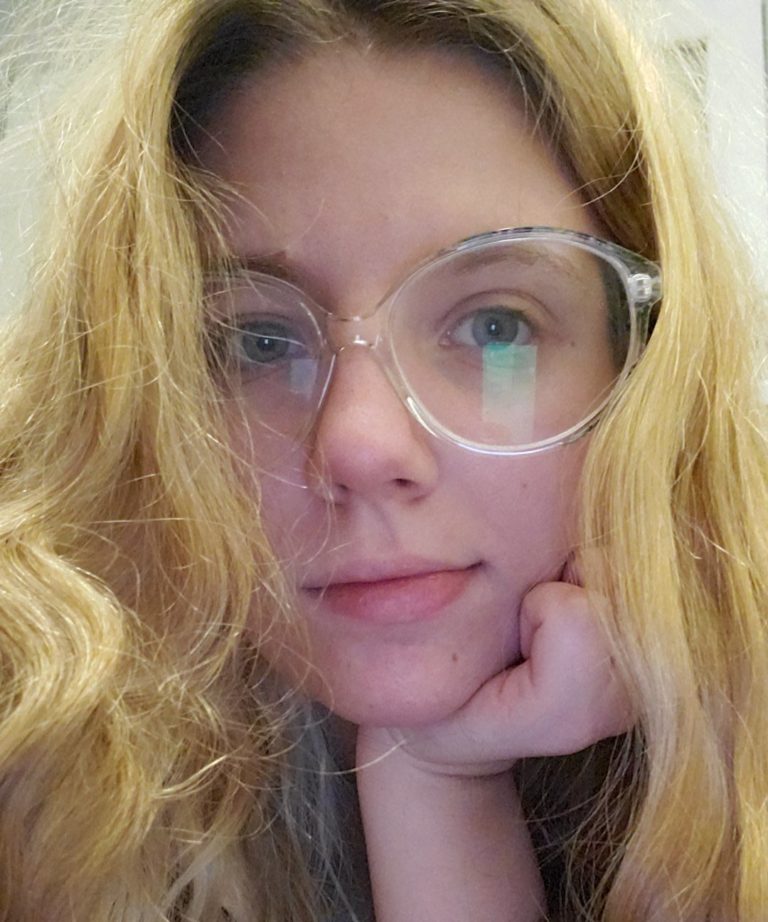
“When the passion for expiation
is chronic, fierce, you do not choose
the way you live. You do not live;
you are not allowed to die.
You drift between earth and death
which seems, finally,
strangely alike…” – Louise Gluck, “Persephone the Wanderer”
I know now that when you turn a man into a god, he does not die. He is inevitable; he is Poseidon with a beard; Hades on a chariot; Pan stealing the survival of the moon. My god sits constantly at my feet, on my shoulder, behind my eyes. Gods, of course, exist for us, silent and taunting, slowly conforming themselves into conjugal intervention until they know our bodies through entrance and scrutiny of entrance. Once they are in, they hang a tireless totem with a lapis stare—the obsidian bulldozer of a look until we shrink back, in romance and worship, until we bend to them, encounter repetition, hug the cyclops, burst out our own eye, and continue with life, living with the memory of gods inside us.
I sit now in the temple of my dorm room. The company of my talisman do not disturb me, but instead, induce a variety of comforts. I enter myself, remembering when my body was not my body. The objects surrounding me– that I frequently embrace in tactile alliance– are stationary, are documents, are psychic links to another world, to worlds with bodies and without them. In my room I do not have to think of beards, but I could if the water offered; yet, here, I know I never have to be afraid of beards. They are not allowed in this temple. Athene will turn them all to gorgons. The bearded deserve stone and to be stoned, not Medusa. I look over to my right, to my right-hand woman, to Sylvia erect on her monument, a two-story tower, a bookshelf, just for her. The shelf is composed of metal and the shelves are not rectangular, but project, with metal wire walls bent into spirals, as two round triangles, as incomplete trinities, as alluvial fans, signs of rivers dying and returning, not fully unlike Styx, leaving their residue of resurrection in sandpits. My fingers, in tenderness, move across a shelved life, of her life, of my life, protruding from the once fertile fans until my first copy of The Bell Jar sits in my hands. I will read it for the sixth time this year. It has been six years, hasn’t it? Since the lithium—too produced by the gods– first deduced my mind to a point, to a silver ball shot with an arrow, to finite mercury. Sylvia was my path to recovery: A man is a god, but a woman is a savior.
***
A girl named Madeline sits across from me in the girl’s small group room. We have taken to tearing our Styrofoam cups into bite sized pieces, consider chewing them, and then placing them into the cup that remains. “What if we stay here until Christmas?” She says, her pondering hands mixing the whiteness into snow. It did not snow this December. My love had surely heated the earth.
Around us, the walls and the ceiling and the table too fall into schemes of whiteness. The tables are foldable plastic, flimsy as Styrofoam. My hands do not shake as much when I move them, as I tear and breathe into visible puffs, creating, gloating and floating into clouds shaped like lions and archers. Dismantling is a process of purification; it recreates the object, makes it unrecognizable, makes it new. This would become a habit in the years to come, of constantly, when nervous, tearing up napkins or Styrofoam or bits of soft paper, quite unaware of my deconstruction.
The cupboards behind the girl are brown, welded by wound and wood. The whiteness appears again inside them. The cupboards, of course, are empty. They do not even contain paper. One must request permission for written confession—or hide one’s exposed, unapproved thoughts as contraband, tucked between elastic and hip. I, however, had convinced the nurses in a fit of full passion and necessity to let me keep a composition book. It only contains medicated scrawls of longing dipped in flowers, in meadows, and in unicorns. In truth, there is nothing to catch us here. I remember that the last time I saw a shooting star, it was falling and so was my heart. I had written this in the notebook. I smile at the girl. She speaks again; my fidgets are too deep to allow speech. “The world is supposed to end in a few days, on December 21st. What if we are here when the world ends?”
The door opens. The other girls arrive. I have told them all about my miraculous love story and a new girl has come and the other girls want me to tell her as well. I do not mind, for this story is always on my mind. It is all I know how to talk about now. Mr. Silvas and unicorns and Malbenocia, the land I am writing and constructing for my fantasy series Key to the Secret Dreamers. Mr. Silvas will find himself as a deity in the Sands of Time or, perhaps, the Seasonal Clock, or, perhaps, the white-haired Sandman will unmask himself all together and it will be revealed that he, not Edelio, will be the best romantic fit for my teenage protagonist, Aquirra. I find myself smiling, my hands fidgeting with excitement; the pieces of white matter continue to fall in the shrinking cup. My breasts have gotten larger since I started taking Lithium and they bounce as if lightened by bubbles as I talk. I imagine him holding them. The pile at the center of the now halved cup begins to overflow. The girls lean forward like the scene from Grease. “Tell me more, Tell me more”. What scene was I writing when I met Mr. Silvas?
The door of the small group room opens and a nurse appears. She waits for a moment and then calls my name. I do not respond. I am too absorbed. There is no world outside of the meadow. The sponge breaks in my hands; I am free of partitions, of what separates me from Him. I am a teacher to other girls on the ways of love. “And when I get out of here, I am going to find him again and we are going to start a revolution of love.”
One girl, who was in the hospital for anorexia, had told me the day before that her dad had seen Mr. Silvas on the news, that he had been arrested. I think, for a moment, going back to that night that I was admitted, that it is my fault, that if I had died like I had desperately tried to, cutting my wrists with the glass horn of a broken unicorn, then there would be no case.
The woman calls me, reaching her hand to my shoulder. I flinch at the touch and turn to her. She is not Mr. Silvas. She is the lady who told me that Dr. Tucker had diagnosed me with Bipolar Disorder, Generalized Anxiety, and PTSD. She tells me to leave the room. Once we are out of the room, her voice is harsh and I am hurt. She tells me: “You are not allowed to talk about this, especially with the other girls.”
I do not understand what I did wrong. The tears nudge into Neptune. I imagine swimming in the icy waters of Neptune with Mr. Silvas, my Juan Smith, as I have been calling him since I came here. “Love must speak. I love him.”
There is something else in her eyes, but I move my eyes quickly away from hers. The Lithium barely lets me write anymore. All I can do is think, draw unicorns, and name them Juan Smith. I want to speak. Her voice is softer when it comes out again. “Your love is wrong, Sweetie.”
***
I look to my bookshelf closest to the door. A Pocahontas movie poster hangs beside it, crumpled from transit, from the movement of the forbidden, of the danger of two worlds coming together. Bodies are cannisters for disease. I have a slight cough heaving itself through my chest; it started this weekend, almost as if my body was not ready for recognition, for the spilling over, for what it takes for a body to remember what has entered it. This is what disease is, the resistance of adaptation, the refusal of entry. I cough. I remember all the others after Him. I remember how many times I wish I could have refused entry.
One book sits on the shelf, always begging me to redact in retrograde, to silence the policeman in the living room, to read the closing chapters. How could I return to Zora and her Janie too stolen from the flowers? Their Eyes were Watching God, but my eyes were watching Him.
***
Three days ago, a policeman had taken my yellow panties. He had placed them with rubbered hands into a bag labeled evidence. Evidence of what? That I had loved, releasing my liquid glitter through a zone that had once been known to sparkle? What could be between my legs that they would need to keep? Has not the place between my legs been through enough? Today, they will split me open in a children’s hospital. Stuffed creatures line the cupboards of the room. An octopus sits beside a bear, a weasel turns into a tiger, the tiger does not prey on the rabbit. The room is not cold, but it is not warm either.
I sit in a room without my mother. The lady doctor asks me questions on penetration. I inform her that we had not gone all the way, that we had gone as far as two people could before the ultimate act. The light in the room disfigures the question, the answer, the woman before me.
“Did you bleed?”
I tell her I am still a virgin.
“Are you sore down there, Sweetie?”
I fidget and scratch my arm. Down there itches, but I do not scratch it. To scratch is to remove. I don’t want him to be removed. “He is always going to be there, isn’t he? This is the way with love, isn’t it?”
She says nothing, but she shakes her head, signaling refusal. How does one refuse? I tell her that I can still feel his fingers inside me, that the ridges of my canal are wheezing his name, that something in me tastes bitterness, that something in me still believes that there is magic in his touch. I ask her if she has ever been in love. She checks the box for digital penetration.
And then, my mother returns; I am returned to my mother. Once again, parts of me must be removed. I do not like removal. It is change. It happens too quickly. They take the dirt from my fingernails. They tell me to uncloak. They examine the sunset of circles in the center of my breasts. They fellate my mouth with a cotton swab and then they check some presupposed ruin of my body. I am not ruined; yet, I know, somehow, that I am not quite a temple anymore either. I stand stiffly– stripped into obscure nakedness as if I am still in the meadow– bothered by the lights that are not the sun, while hands trying so hard to be gentle only push me further into a cold place.
I have not told anyone that I have ceased in my daily doses of Paxil. I once believed very much in my inhumanely strong will power as a friend had once described my resistance to conform; yet, in truth, it is simply that the ways of others do not make sense to me. Why does love with a man only a decade older not make sense to them? Did they not invent the proverb: Age is but a number? I feel that I must cope with this without medicine.
My mother is crying beside me. My mother has always been Demeter, discovering me in the meadow to only find me missing from the earth. Through attempting to save me, she has conjured a winter for herself.
I did not need to be saved. I would have run away with Him if given the chance. I would have cooperated; the rabbit following the tiger in loving devotion, not prey. Not prey. I repeat this to myself.
The lights fidget and flicker as I do. The nurse assuages me, her voice an alternating hum. Her face flimsy with kindness; her jaw worn low. She has seen too much. She has heard too many stories. I had hoped that my story of love would ease her worries. I squeeze my stuffed unicorn and my mother’s hand as I open my legs for the woman before me. “Lay back. I promise this will be gentle. Tell me if it hurts.” Her calm passages strike me. They sound too close to Mr. Silvas’ reassurances. I feel my thighs shake. I think of his hands. I think of his hands moving mine. The pear of anguish—as I have called it, having watched a documentary on medieval torture a few months ago– sentences me to a desert silence; the utter of the witch; what a whore I must be; what great sin I must have committed.
***
I cannot resist looking up; looking up is how we find our gods and how we find forgiveness. On my bookshelf closest to my closet– which must, when not in use, remain closed as I do not trust doors that are left open—is a tan bra with subtle animal print tucked behind Tiger, Tiger by Margaux Fragoso and What is Gone by Amy Knox Brown. I disturb it. I unbury the mute rose. The cups have decayed into bowls, have shifted in the rift of a widening body, of removed wires, of being unable to support the girlish breasts still warming into womanhood, of being circumcised in the madhouse. I submit to the urge to replace myself into the cups, tugging the straps over the sag of my bending vanilla, hooking myself back into virginity, wearing trauma as an automaton.
***
“You are so hot.” His breathing is fire. I am the center of fire. His fingers have climbed themselves between my legs, unafraid of the hair; I am pubescent as prayer. I am new in my body; he is the scalpel digging into the new moon. By now, I have been taken to the underworld, given the pomegranate, cooperated in my dosage. The world runs solid with touch and uncertainty, with the willingness to run away, with his hand grooming the inarticulate world inside me. “You are so tight.” He repeats again and again. I think of him as Peter Pan, as wanting to return to youth. He says that I remind him of a girl he had kissed in a football stadium at midnight when he was my age. It is not midnight. There is too much day. There is too great of possibility that we are being watched; I, however, am already being watched, watched by Him. He is my watcher. I am the virgin of his dreams. I am the girl who gives birth to womanhood in a meadow.
He lays me on the ground. I am beneath him. My hair has fallen from the bun and then there is only heaven; then there is only hell. He probes deeper and deeper. He kisses my face. I kiss back. I have always been good at kissing. I am not sure, however, how to move the rest of my body. He is my teacher. He should teach me. We had met through PILLARS, the club I had created, the first philosophy club of Kennedale High School, and, according to Plato, in the Symposium, the ideal form of love is between a teacher and his student.
The grass is on my still clothed back. My tan bra, printed by the animal, is unhinged, squirming from support. His face finds sanctuary between my breasts. He sheds parts of his beard, leaving the traces of his fulfillment between the church of my cleavage. He partakes to me remains from his own wisdom; they absorb into me. Later, the particles of the beard will burn, friction forming a very red rash; for now, I am christening him. I am the water of baptism. I am a girl drowning in a lake. I am the girl who has grown fat on pomegranates.
“You are so special, Hannah.” He removes a condom from his wallet, sets it beside my head. His hands do not leave my sacred hole. It belongs to him. He may drink it, for it fills with water. He grinds his groin between my legs. It is covered by the sweatpants; it is hard. I have the sudden desire to inspect it. To see if it is made of stone. He grabs my hand. My hand is now his hand. I am hesitant. He grips tighter. I look for a unicorn in the grass.
“Don’t be afraid”. He whispers as he removes my hand from my body, as he slips it like a lost letter down the elastic of his pant waist, down to the fur of Cerberus, the testicles of the boatman sit below. He wraps my fingers around the stone that is not a stone and begs to me not for water, not for love, but for movement.
***
I prefer stillness in my autnest—a perfected construction of books and unicorns and poetry and a salt lamp, all beneath a lifted bed, the only custom to fully fit my autistic sensibilities. This is my safe place six years later. There have been other bodies that have moved my body when I had wanted to be still; the entrances would occur almost as if a command, a curse, a repetition hitting the nerve of every Fall for three years. Demeter is weeping and so the earth punished me at first; she let it happen again and again. There is forced nakedness. There are new worlds in the alleys behind the houses. There is, of course, always the meadow.
I reflect without windows, with Sylvia at my side, with the earth under my feet, with the night swelling some distances. Right now, there is some spirit nudging and gnawing. There is a ripe fruit already rotten between my legs. There is the night exiting the world, entering the underworld. In the darkness, night is sacrilegious. It is the guarantee that there will be a moon. The moon too must never walk at night. Persephone cries from the other side. I do not know how to go back for her. My legs are rusty with the hair I have kept; tiny scabs frolic the re-creation of a meadow on my now womanly legs. I am not sure if I am a woman or if I am still a girl. I have scratched my body into infinity; I have tried to claw out of it; I have tried to erect monuments; I have tried so many times to permanently go to sleep. He is in me with the army of men that came afterwards. They are demigods. They are his children.
On my lap, Perseus, my unicorn purse sits holding me, even if to the observer, I am holding him. He is the most important object other than my backpack, which forms itself as a carriage, a reminder, red and fused to my body, of comfort; Perseus, however, is the ultimate link to trauma. He is a witness, now wet with my tears of resurrecting a god, trying to forget all other types of wetness. My Perseus saves Medusa; he keeps her in a therapy room without mirrors, with clay that she could turn to marble. My Perseus does this because he could not save me. Where is mercy? Where is love? Where is the beard of my god?
***
I had arrived beside the red water fountain. Red and water. This is the Virgin’s birth. I do not think this now. I think this in the future. Now, Perseus sits in front of me in the grass. He is, perhaps, my soul guardian, just as Aquirra’s soul guardian is Razzle Pie, the unicorn with the rainbow horn. My hair is in a bun today. I wear a shirt with flowers; the ruffles extend in tercets down to the partition between hip and thigh. I wear black leggings, clinging to my form. My feet entrance themselves in shoes splattered with the rainbow. I had carried a bag full of books and journals. I had wanted to show my teacher, my love, my teacher all that I could know.
The meadow is Demeter at her best. To one side, there is nothing but wood. The park has disappeared. Behind us, in the distance, is a billboard and the weight of cars pushing into duty. This is the place without childhood, without adulthood, without time or age. The field is the eternal yellow, the gold melting into us, into nostalgia and timelessness. The wind enters extravagant. It roars, splitting the atom; however, I know nothing of atoms yet. I too am small. At times, I am a pixie, a fairy in feathered cloth, wearing flowers, wearing love. Why does he stare?
Mr. Silvas is dressed for a marathon or a day at the gym or a pursuit. He wears a Bob Marley t-shirt with his chest hair stuttering over the neckline and sweatpants with a slight bulge between his legs. I was very surprised to see him dressed without a tie and a vest and his usual purple; however, his beard was undeniable. It appears to me years later, cornered up to his ears, evaporating any illusion of skin. It is dark like fire after it is through burning, like the lines of the trees when night insurrects all mediums, when the dunes are dusty, when morning is insurmountable, when the crow enters cock-eyed beside the raven and the two become indistinguishable.
In this world between worlds, there are only the elements between us. He sits, hunched over, staring. Perseus stands guard. I sit in tension with my legs crossed.
He leans over; his mouth a mirror of mine. How did we get here? How did we learn to breathe? He had told me the night before how he would like to meet in secret, that our love would be forbidden. I told him that it would be like Pocahontas and John Smith. He told me that others would not accept it, that I could tell no one.
His eyes are re-lighting the fire of his beard. They are dark, igneous stones hanging, cooling the world after explosion, haunting the inhabitants with the reminder that there was an explosion. A cloud passes over the sun; for a moment, it is almost night. For a moment, one could believe the earth would open up; one could almost touch heaven; one could almost touch hell. A car in the distance disturbs my settlement. I jump slightly. Perseus remains vigilant; the unicorn must always guard the maiden. I look at the clouds, thinking one of them appears as an archer and then phased into a lion. I take this as a sign. Mr. Silvas is a Sagittarius. I am a Leo.
I reach down to pet Perseus. He does not move. I do not move. The earth continues to move. “Your eyes are beautiful.” He says, removing my glasses, examining the no longer still waters dilating around my pupils. The sky is too far away. There is only the bearded god and the earth. There is only Mr. Silvas, Perseus, and I. Mr. Silvas leans forward into my line of fog, my fingers picking at the grass, looking for flowers, uplifting the punishment of the plucked. He leans further, further, further into me. There is no such thing as citadels as bodies. There is no such thing as My Body. Perseus is in the air. Winter is in the air. A chariot is flying up from the underworld.
His voice is the medallion of a huffed bedtime story; his hands remove the singular barrier; his voice suspends the girl, locks her below the earth, until years later, it will be as if she never left the meadow: “Move over, Perseus, I am taking your place.”

H. E. Riddleton
H. E. Riddleton is a neurodivergent, mentally ill poetess who spends her time, in addition to writing and trying to survive daily life, as a passionate English major, a climate-anxious tree hugger, an avid maker of collages, a curious ponderer on the ways of the universe, and a White ally trying to find ways to advocate for others so we can all make a better world together. Her publications can be found in The Visitant, The Light Ekphrastic, Not Very Quiet, Persephone’s Daughters, and No Tokens Journal.


